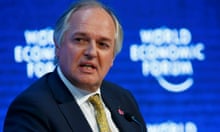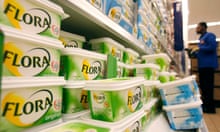Unilever is to cut the size of British ice-creams including Magnum, Cornetto, Ben & Jerry’s and Feast by up to a third to bring them all under 250 calories.
From the spring, Ben & Jerry’s single portion tubs will be reduced from 150ml to 100ml, a 33% reduction in size. The price, however, will only drop by 26% – from £2.04 to £1.50, according to a report in the trade journal, the Grocer.
There will be smaller drops in the size of other ice-cream treats with a Magnum Almond, the most calorific of the brand’s choc-ices on sticks, dropping from 110ml to 100ml, a Magnum Classic will drop from 120ml to 110ml and just 2ml will be sliced off a Feast Chocolate, taking it down to 90ml.
Unilever said some of its ice-cream products – worth £5.4m annually in UK retail sales – will be dropped altogether, including Magnum Infinity Chocolate & Caramel, which has 274 calories, Magnum Infinity Chocolate, and Cornetto Choc ’N’ Ball.
The food group said it had spent 18 months with a signifiant amount invested in research to achieve its aims of bringing all its “single-serving” ice-creams below 250 calories.
Noel Clarke, executive director of brand building for Unilever UK & Ireland said: “We have introduced this 250 calorie cap to help make it easier for our consumers to make informed and healthier choices when enjoying their favourite ice-creams as part of a balanced lifestyle.
“It was important there be no compromise to taste or quality and that’s exactly what we’ve delivered.”
However, the company is likely to be criticised for increasing the price per gramme of products under the veil of a healthy eating drive. Clarke admitted to the Grocer that there was a risk of a customer backlash but said he was confident shoppers would “appreciate what we are trying to do ... and buy more”.
The move comes after Unilever cut calories in children’s ice-creams, such as Funny Feet, Twister and Calippo, to 110 calories by 2012. Several confectionary companies have also cut the size of their snacks in response to the government’s anti-obesity drive.
Cadbury pledged 18 months ago to stop making and selling chocolate bars in the UK that contain more than 250 calories. It cut the weight of a Dairy Milk bar from 49g to 45g by making the corners more curvy.
And in 2012, Mars said it would cut the calorie content of its bars to a maximum of 250 by the end of 2013, in line with the public health responsibility deal promoted by Andrew Lansley, the former health secretary. That led to a Twix shrinking from 58g to 50g, a 14% reduction, and Snickers bars being cut down by 17% from 58g to 48g.
But the food companies have been criticised for shrinking the size of popular products as a way to make more money without making the changes clear to their customers. Just over a year ago, a survey found that Christmas treats, such as Cadbury’s Roses, Nestle’s Quality Street and Terry’s Chocolate Orange Segsations had all shrunk in size while prices had gone up.
Mumsnet’s chief executive, Justine Roberts, said: “Issuing single-serving packs that come in at under 250 calories seems sensible enough – although of course we can’t necessarily promise that we won’t eat two, and lots of Mumsnet users are increasingly more concerned about sugar than they are about simple calories.
“Most consumers would probably hope the price would fall to reflect the size reduction but the truth is we’ll probably carry on buying the product anyway – albeit with a fair bit of grumbling.”
Marius Luedicke, associate professor of marketing at Cass business school, said Unilever was likely to be able to introduce the changes without a major negative reaction from its customers.
“People will never do the maths and the price is not interesting. What’s interesting is the benefit of keeping calories lower. If there’s an ethical issue it’s that the idea of less calories might lead to people eating more ice-cream than before.”






Comments (…)
Sign in or create your Guardian account to join the discussion